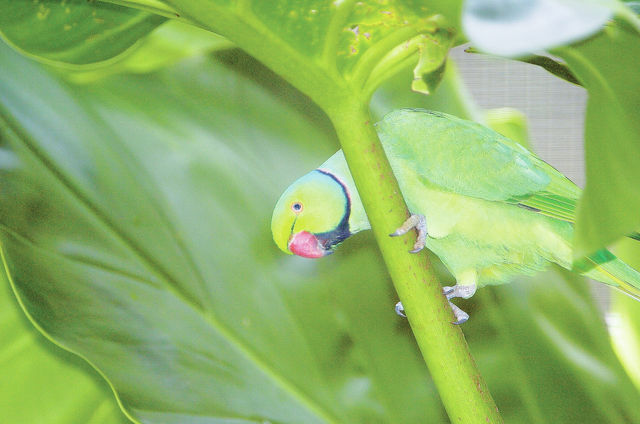KOLOA — Residents and business owners on Kauai have spent thousands of dollars in the past year dealing with rose-ringed parakeets, an invasive bird that’s gained a foothold on the island.
Kuhio Shores in Koloa, for instance, has spent more than $3,000 to handle the daily aftermath of a population that took up residence in their neighborhood about a year ago.
“Most of the residential complaints on our property come from all the excrement from the birds,” said Albert Fernandez, property manager for Kuhio Shores. “They roost in the palm trees and shower trees and leave a mess all over the cars.”
Across the street at Prince Kuhio Condominiums, property manager Jack Bernard and his crew have an hourly morning cleanup directed specifically at the birds’ nightly layer of muck.
“They roost in the trees and drop poop in our koi pond and swimming pool,” Bernard said.
Both Bernard and Fernandez have tried using foghorns and lasers to chase the birds away, but their efforts are proving fruitless and they’re looking for more options.
“We had to go as far as to cut all the fronds off of our royal palms and pay to get the grounds cleaned,” Fernandez said. “We have also used a pressure washer to scare them and they just keep coming back.”
In 2011, the United States Department of Agriculture National Wildlife Research Center conducted a two-month research study that documented the patterns of rose-ringed parakeets on Kauai.
That research project needs to be completed and in order for that to happen, the state needs to fund the project. The Legislature considered the project, which has a price tag of $468,000, during the last session.
“Although this legislation didn’t pass last year, we hope to be successful this legislative session,” said Rep. Dee Morikawa. “The Kauai delegation will be introducing a bill relating to the impacts of the rose-ringed parakeet.”
She continued: “We need to start the research and tracking of these birds in order to formulate an effective control plan.”
Rose-ringed parakeets are native to Africa and India, but have been introduced to multiple places around the world. The first population on Kauai was established in the 1960s and was introduced by workers at a Lawai bed and breakfast.
There were 50 birds within the population in the 1980s, according to USDA NWRC research biologist and field station leader, Aaron Shiels, who wrote a research paper on the history of the birds.
Now, the population is estimated at about 5,000 birds on Kauai.
“From a conservation standpoint, the rose-ringed parakeets pose a threat to native wildlife, as they are potential carriers of avian malaria,” said Thomas Kaiakapu, Kauai wildlife manager for the Division of Forestry and Wildlife, part of the Department of Land and Natural Resources.
Kauai’s native forest birds are vulnerable to avian malaria, he said.
Rose-ringed parakeets are also a challenge for agriculture on Kauai, as they like to eat papaya, mango, lychee, lettuce, long bean and tomato, said Kathryn Fiedler, of Kauai Invasive Species Committee.
“They are among the most significant invasive pests of agricultural food crops,” Fiedler said. “Daily flight paths also allow the parakeets to disperse any invasive plant species they have fed on, including strawberry guava. They have also been seen feeding on koa and other native forest seeds.”
The colorful birds are eye-catching, Fiedler said, and rose-ringed parakeets can be fun to watch, but the good qualities of the invasive species doesn’t outweigh the impact they’re having on the island.
“Please do not feed them or encourage roosting behavior on your property,” Fiedler said.
The birds can also be controlled through a permit with Kauai DOFAW for those who have larger agricultural properties.
“A concerted effort needs to be undertaken to determine the potential threat this species poses to Kauai and to find effective solutions to remove or control the population on the island,” Kaiakapu said.





